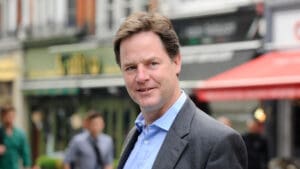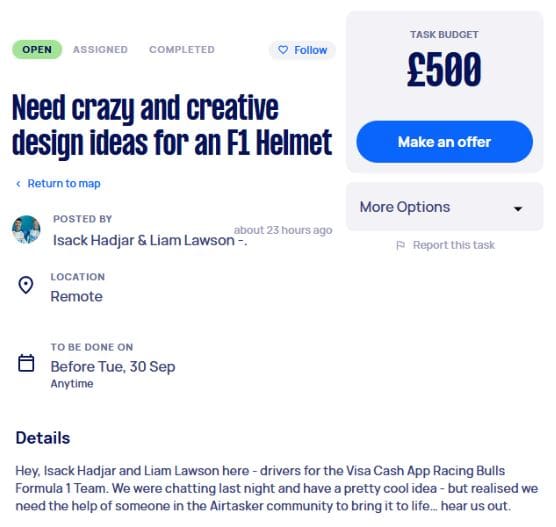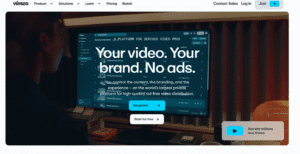
Nick Clegg urges Britain to rediscover optimism and tells Silicon Valley to drop the self pity
Sir Nick Clegg has never been short of vantage points from which to view power. After five years as Deputy Prime Minister in the coalition government, he spent almost seven at the heart of Big Tech as Meta’s president of global affairs.
Now, in a recent conversation with Wilfred Frost on The Master Investor Podcast, he offered a bracing diagnosis of Britain’s malaise, a withering assessment of Silicon Valley’s culture, and a pragmatic take on how artificial intelligence and free speech should be handled in the years ahead.
Clegg’s fondness for Britain is undimmed, but his verdict on our current mood is stark. The UK, he argues, is “remarkably creative” for a “soggy, muddy island”, yet something has curdled. “It’s as if the country has fallen out of love with the future,” he says, lamenting a pervasive habit of talking down people and ideas. By contrast, Americans “celebrate success” in a way many Britons find “a bit frothy” — but which, he insists, creates its own momentum.
That cultural divergence is reinforced by economics and geography. When he was in Downing Street, Clegg notes, the GDP of Europe and the US was broadly comparable. Today, he observes, the American economy is perhaps 1.5 to 1.7 times larger — the product of faster rebounds after the financial crisis and the pandemic, stronger demographics, and the structural advantages of a continent‑sized market. Europe, for all its virtues, is a “trickier” neighbourhood.
Silicon Valley’s self‑pity
From Westminster’s rough and tumble to California’s wealth and influence, Clegg was struck by an unexpected phenomenon: thin skins in high places. “There’s this odd culture of very rich, successful men who feel terribly sorry for themselves,” he says of parts of the Valley. Many celebrate their role as disrupters, yet complain when disruption brings criticism. “Either be a disrupter — and take the flak — or don’t,” he shrugs, adding that the recent vogue for conspicuous “bro” bravado sits uneasily with a streak of “simpering self‑pity”.
His discomfort grows when political and corporate power get too cosy. Clegg worries that tech leaders and Washington are binding themselves together around a single idée fixe: beating China in AI. The rhetoric — and the spending — can sound like a reprise of the Cold War, with an assumption that the United States can outspend its rival to a decisive victory. That, he argues, misunderstands both the technology and the geopolitics. “AI is too versatile and too dispersed to deliver a single knockout blow,” he says. China is “far too powerful and technologically adept” to be treated as a foil in a winner‑takes‑all race. For Clegg, the smarter path is renewed partnerships with allies, not tariffs and chest‑beating.
Zuckerberg’s big swings — and AI realism
What of Meta’s own arms race? Clegg defends Mark Zuckerberg’s taste for outsized bets — Instagram and WhatsApp looked expensive at the time, he reminds us, and proved prescient. Even the metaverse, much mocked, may pay off over the long run as we migrate from hand‑held screens to new interfaces. But he injects a note of sobriety into the AI hype cycle. As each new model arrives, the step change can be less than the marketing suggests. “We were told [a next‑generation model] would be the moment we walked through the looking glass,” he says. “It’s a great improvement — but an incremental one.” If the industry is now “squeezing more out of the same paradigm”, he asks, will the revenue ultimately justify the capital outlay?
Meta can fund experimentation because its ads machine keeps humming, Clegg says, but none of the giants can rely forever on growth by capex alone. For their part, the AI specialists have begun to earn real money from enterprise tools and APIs — welcome, but not yet transformative at the scale of investment being made.
Clegg, for his own part, has moved on cleanly. After leaving Meta, he sold his remaining shares — not as a market call, he insists, but as a way of turning the page between distinct chapters of a career that has taken in Brussels, Westminster and Silicon Valley.
Free speech, the law — and a necessary reset
Asked about claims from figures such as Elon Musk and US senator JD Vance that Britain lacks robust free speech, Clegg’s response points in two directions. First, he bristles at lectures from Washington: “Just butt out,” he says, noting what he sees as a striking double standard in the way the current US administration deals with dissent. Yet he also believes the UK has indeed tilted too far towards criminalising online speech. Citing reports that police make dozens of arrests each day for social‑media offences using pre‑digital statutes, he argues that a free society must tolerate “ghastly, offensive” speech unless it incites imminent harm.
The pendulum, he suggests, has swung widely over the past decade. In the late 2010s, he found corporate America “humourless and earnest” about speech — a climate that hardened further under the pressures of the pandemic. With hindsight, he concedes, platforms over‑corrected as they tried to contain harmful misinformation during a period of acute uncertainty. Today the backlash risks going too far the other way, towards an absolutist, “cardboard‑cut‑out” libertarianism that few truly practise. “Free expression becomes ‘free expression for stuff I like’,” he says of some of Musk’s interventions.
Clegg is unapologetic that platforms enforce community standards which go “well beyond” the letter of the law — a reality often overlooked when politicians and commentators complain they are not going further still. Private companies, he points out, are being asked to act as philosopher‑kings in a space where democratic consensus is elusive.
The coming shift, in his view, is even more consequential. For two decades, social networks could plausibly argue they were conduits for speech created by others. Generative AI complicates that defence. Increasingly, users will engage directly with AI agents or avatars — “the sharp arrowhead” of technology built and deployed by the companies themselves. Liability, therefore, will evolve. Clegg worries about interactions between these systems and children, teens and vulnerable adults, and about the sophistication with which AI will impersonate human conversation.
He also observes a strategic realignment at Meta and its peers. The firm’s original advantage was its “social graph” — the map of relationships among friends and family. Now, like TikTok and YouTube, its services are pipelines for algorithmically recommended entertainment, increasingly including synthetic content. In that world, responsibility and risk look different. It may yield a “cleaner” internet if companies are forced to take more direct accountability — but it will also demand more scepticism from users. “One of the ways we will have to live with the online world is by fostering society‑wide scepticism,” Clegg says, especially among the young, because so much more of what we see will be AI‑generated slop.
On the question of past harms, he defers to the coroner’s findings in the Molly Russell case, while stressing that the company changed policies and systems to make a repeat of her experience less likely. It does not make the internet risk‑free, he says soberly, but it is “very, very different” from the era in which she was online.
What leadership really demands
Clegg closes with a defence of politics as a craft. Leadership, he argues, is harder in government than in business: the trade‑offs are “dizzying”, accountability more relentless. British ministers, however senior, face constituents every week — a discipline that keeps them close to the real world. By contrast, he has seen chief executives take umbrage at a critical adjective on page 13 of the FT. The lesson for both spheres is the same: resilience matters, and so does perspective.
If Britain is to regain its optimism, Clegg implies, it will need to rediscover the confidence to build — and the generosity to celebrate those who try. And if Silicon Valley wants to lead responsibly, it must shed its self‑pity, temper its absolutism on speech, and accept that AI’s future will be collaborative, not imperial.



